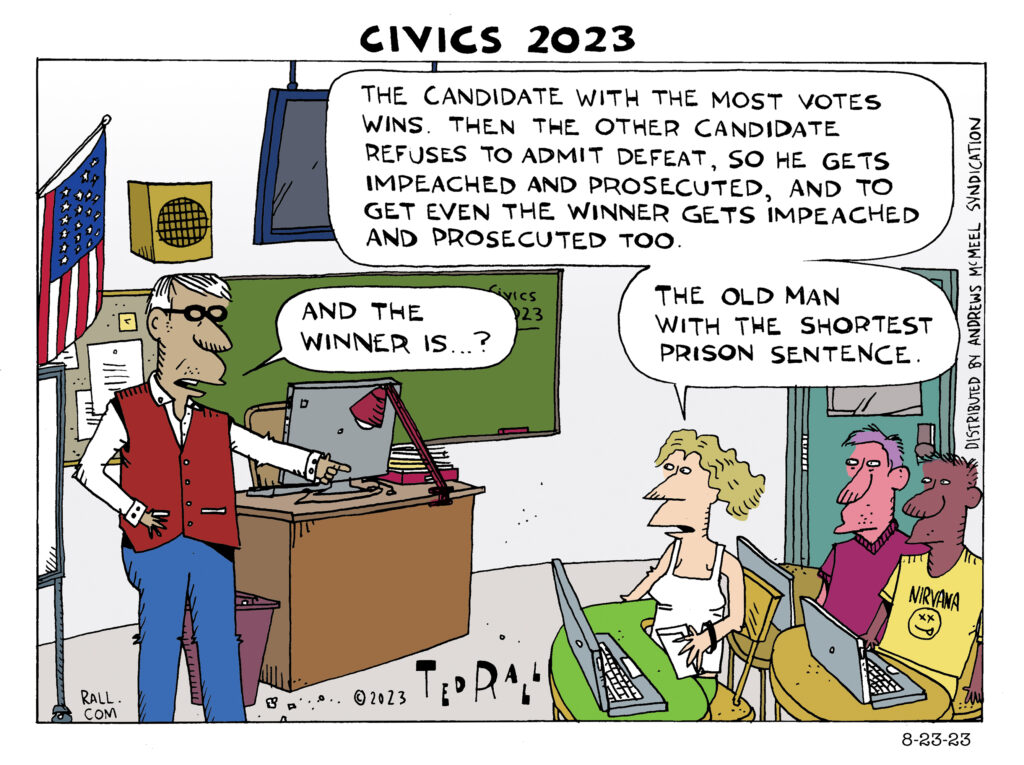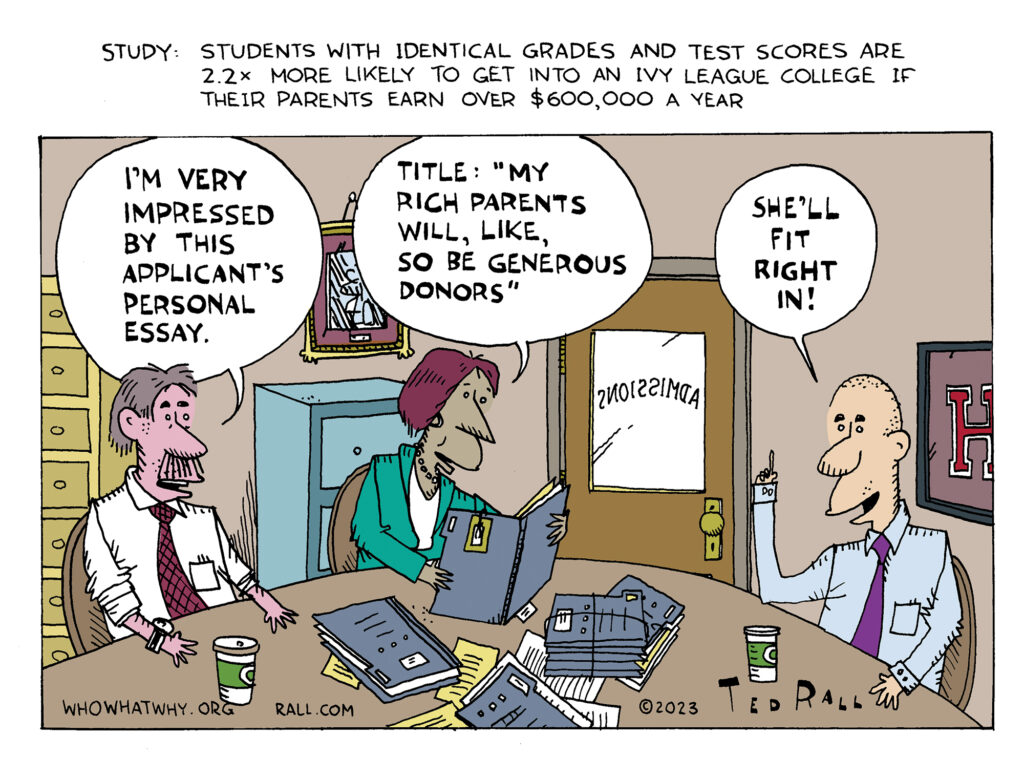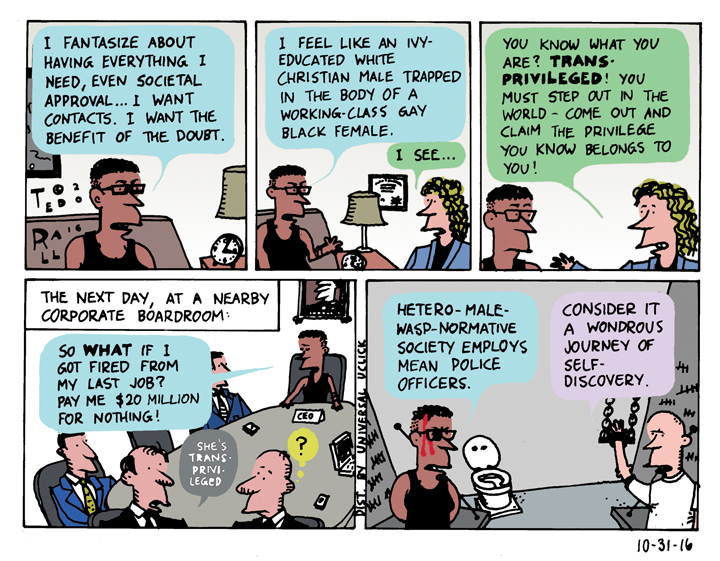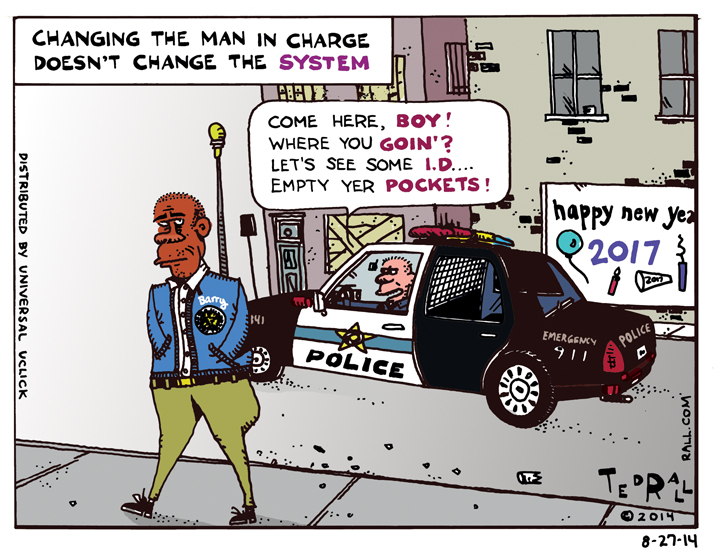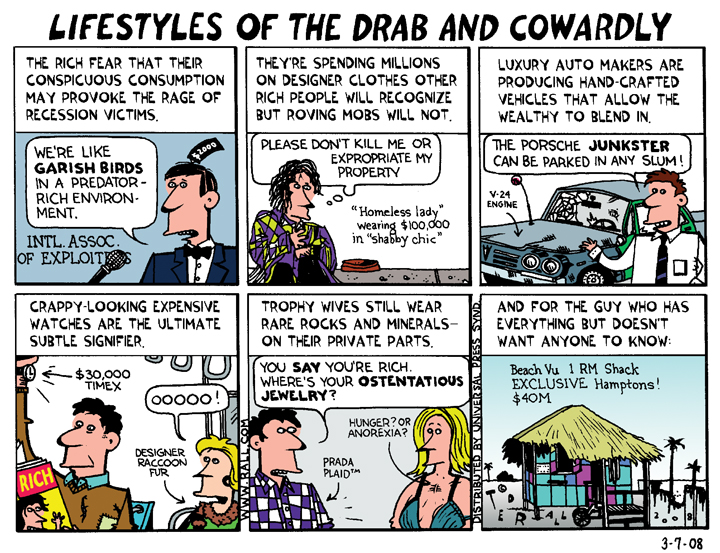Clinton was impeached over lying about oral sex, Trump was impeached twice, Biden will likely be impeached soon and Trump faces 78 felony counts on various rounds of charges. Lawfare as political combat has become normalized to the point that, in the future, elections will matter less than the courts to politicians.
Death to the Greedheads of Premiumization!

The Five Boro Bike Tour is a glorious treat for big Apple bicyclists accustomed to dodging car doors, taxis and potholes in search of skimpy unprotected bike lanes blocked by double-parked delivery trucks. Once a year, the humble urban biker is elevated to king of the road.
You set out early one morning from the Financial District for an all-day exploration of some of the city’s most fascinating nooks and crannies. You navigate wide avenues l free of motor vehicles and make your way around Manhattan, Queens and Brooklyn. You and your fellow cyclists enjoy free reign of some of the biggest bridges and highways, culminating with the final, challenging climb across the Verrazano bridge over New York Harbor to Staten Island. I did it more than 20 years ago and still remember shouting with joy as we coasted under the giant green reflector signs over the FDR Drive, nary a car in sight.
I was planning to do it again this May. Then I found out about the fee.
“Standard registration for adults and youths costs $129, plus processing fees, $27 of which is a tax-deductible charitable donation to Bike New York to fund our free bike education programs,” according to the Tour’s website. (Not that free.) When I did the tour two decades ago the cost was nominal, about $30. Now they’re charging $256 for two people—for a paper tag with a number on it and bottled water along the way? That’s the same as two nights in a decent hotel room, two Amtrak tickets from New York to Washington, two very nice restaurant meals, eight really good books.
$256? That ought to cover a bicycle rickshaw and someone else doing the pedaling.
What really sent me into a blind rage, however, was the tour’s Dickensian caste system: For $400 plus $84 in “processing fees,” or $968 for two people—President Biden’s “junk fees” bill comes to mind–New York’s toniest cyclists can buy “VIP” tickets. VIP status buys you “guaranteed placement in the first start wave,” a “timed climb” across the Verrazano, breakfast and lunch, and some swag. The famished peasants who can only afford $156 cool their heels as they watch the VIPers chow down and speed off in front of them.
There will be a Revolution. It will be violent. As always, the rich will go to their deaths wearing that idiotic wide-eyed “I’m totally surprised” expression. Us? Why are you so angry? What did we do?
May these overprivileged bastards tumble over their handlebars, smash their designer helmets and empty brains on the pavement, and tote their custom, limited-edition Tour-branded Manhattan Portage bags on their tumbrels to the fires of Hell.
The bike tour’s sponsors and organizers appear to have succumbed to what The New York Times reports is a new trend of “premiumization” in the corporate world. “Businesses have long segmented customers, trying to push richer ones into pricier and more profitable purchases: Think of the spacious premium seats on a plane versus the cramped economy-class alternatives. But the trend picked up during the pandemic, and the lurch toward luxury is now spanning a wider array of products and services,” according to the Times.
Consumers may fall for it, but most of us despise premiumization. A 2016 study of “air rage” found that economy passengers were 3.84 times more likely to have an air-rage outburst on planes with first-class sections, and even more likely if they had to board through first class on their way to coach.
One of the best things about biking is that it’s a proletarian pursuit. You can buy an excellent bike new for $300—even less used on eBay. Bikes are inexpensive to maintain. You can wear shorts and a T-shirt. And it’s free transportation! The tour’s gentrification of something as liberating as bicycling is a galling corruption of a small-d democratic space.
Nowadays no product or service is so humble as to be immune from attempts to subject it to hateful first-class/coach class stratification. The Times notes that Krispy Kreme plans to sell “premium specialty doughnuts” during the holidays. What are you going to ask your child to eat, our new expensive doughnuts or our old regular crappy ones? After building consumer loyalty with generic weed, legalized cannabis companies’ next step is to upsell by offering higher CBD and THC content. “WD-40, the firm that makes the lubricant of the same name, has found that customers will pay more for products with enhancements, like a can with a ‘smart straw’ to spray the lubricant in two different ways—in either a precision stream or more of a mist.”
Let the peasants lubricate imprecisely.
Premiumization has failed in amusement parks. After annoyed visitors stopped attending, Disney was forced to roll back obnoxious fees for parking at its parks and reduced the number of “premium days”—i.e., high-demand days to visit, because people find those days convenient—for which it charged extra. “In the nine months through September, attendance at [Six Flags] parks fell by 25% from the year before, spending per guest rose 22% and, in the end, profits fell by nearly 10%.”
AMC Theaters has taken heat for its plan to shunt poorer moviegoers into slum seats with poor sightlines. “The movie theater is and always has been a sacred democratic space for all and this new initiative by @AMCTheatres would essentially penalize people for lower income and reward for higher income,” tweeted the actor Elijah Wood.
In a capitalist economy, of course, democracy is an illusion. Prior to AMC’s move the best seat in the house went to whoever lined up first. Many people can’t afford to go to the movies at all. As for the bourgeois who all paid the same price to get in, some could get popcorn and Skittles while others went without. They drove different cars to get there. They went home to residences ranging from penthouses to housing projects. But Americans still value the fiction that everyone is middle class.
Money talks, fairness walks. Premiumization will vanish if and when Americans decide to Just Say No to price-gouging, upselling and stratified consumer castes. As for me, I’ll save a few hundred bucks and conduct my own personal bike tour around NYC for free, at my own convenience—with no up-charge for dodging car doors and potholes.
Until the Revolution, anyway.
(Ted Rall (Twitter: @tedrall), the political cartoonist, columnist and graphic novelist, co-hosts the left-vs-right DMZ America podcast with fellow cartoonist Scott Stantis. You can support Ted’s hard-hitting political cartoons and columns and see his work first by sponsoring his work on Patreon.)
Corporate Journalists are Blind to a Big COVID Lesson
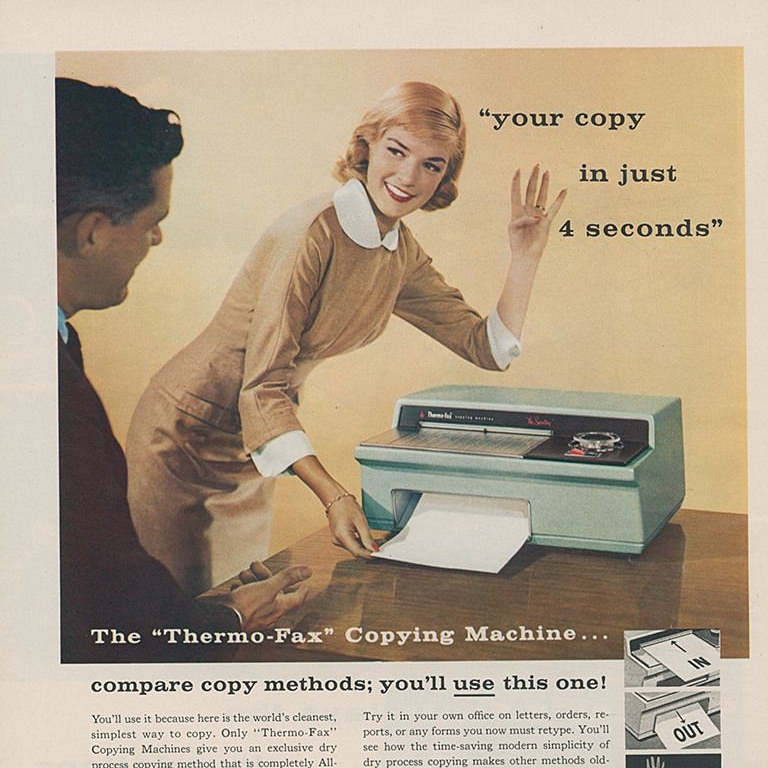
One of my complaints about mainstream media is that they recruit reporters from inside the establishment—Ivy League colleges, expensive graduate journalism programs, rival outlets with similar hiring practices. Some staffs develop admirable levels of gender and racial diversity. But they all come from the same elite class. Rich kids believe in the system and they accept its basic assumptions.
On New Year’s Day a reporter (UPenn and Oxford, of course) published a solid piece for The Washington Post about an important issue, how America’s “fractured healthcare system” hurts our response to COVID-19. Seeking to answer the question of why the pandemic is still going on after the miraculously rapid development and distribution of vaccines, the Post identified organizational shortcomings as part of the problem, citing the need for “improvements on the delivery side.” She quoted an expert who called for “increasing staffing and funding for local health departments, many of which have been running on a shoestring. Officials in some local health departments still transfer data by fax.” Both true. I’ve been asked to fax my records recently.
But.
Nowhere in the Post piece was there any mention of what the United States is missing that most other countries in the world are not: a unified national healthcare system like the United Kingdom’s NHS.
I’m not talking here about fully-socialized medicine or a single-payer Medicare For All system like the one championed by Bernie Sanders, although I strongly believe Americans need and deserve one. This isn’t about who pays for healthcare (though it should obviously be covered 100% by the government).
It’s about data integration.
In the same way that law-enforcement agencies across the country can access criminal records from other jurisdictions via the FBI’s National Data Exchange system, public-health officials need access to a real-time, constantly-updated source of every report of disease whether it’s known or novel, the visit was paid for in cash by the patient or covered by insurance, or it was diagnosed by a country doctor, walk-in urgent-care center or a giant urban hospital system.
A fully-integrated national healthcare database would be a powerful side benefit of a national healthcare system like Medicare For All. But how likely is Bernie Sanders’ pet project to cross the mind of a writer who graduated from UPenn and Oxford and has a gold health insurance plan provided by her employer, who is Jeff Bezos?
Here in America, the nation’s top epidemiologists at the Centers for Disease Control are flying blind, relying on algorithmic models that estimate what’s going on rather than providing accurate, precise situational awareness.
I tested positive for COVID-19 on December 30. I notified my doctor’s office on January 1 but due to the holiday didn’t hear back until January 3. Will New York City authorities and/or the CDC be notified about my case and, if so, when?
Several friends and friends of friends also tested positive during the Omicron surge using home tests. Many, probably most, didn’t tell their doctor. You have to assume that official numbers for Omicron have been significantly underreported.
If we had a national healthcare system instead of a medical Wild West in which the ailing are jostling against each other fighting over $24 testing kits like shoppers rushing into Best Buy on Black Friday, testing would be handled through clinics and doctor’s offices in coordination with the federal government—which would instantly compile the results.
A national healthcare database could include “visualization tools to graphically depict associations between people, places, things, and events either on a link-analysis chart or on a map. For ongoing investigations, the subscription and notification feature automatically notifies analysts if other users are searching for the same criteria or if a new record concerning their investigation is added to the system… [allowing] analysts to work with other analysts across the nation in a collaborative environment that instantly and securely shares pertinent information.”
I lifted that last quote from an FBI description of their police database. Crime, by the way, kills a small fraction of the number of Americans who die from disease.
HIPAA regulations governing patient records would need to be modified by Congress, but consider the potentially lifesaving benefits even when there is no longer a pandemic. Medical errors are the third leading cause of death in the United States.
Decentralized recordkeeping is a public-health disaster. If you live in Wyoming, there is no good reason that your healthcare records shouldn’t be accessible to first responders driving the ambulance that responds to a call that you collapsed and are unconscious at a mall in Florida. As soon as you are identified—something that could be facilitated by a national healthcare ID card that you carry in your wallet or as an app on your smartphone—EMS workers could use your patient history to identify chronic problems. They could avoid a medication to which you might be allergic or feel confident in administering one thanks to the knowledge that you are not.
I didn’t go to UPenn and Oxford. As an independent writer, I pay my own health insurance. I am reminded of America’s crappy healthcare system every time I pay my ACA bill and every time I cough up a co-pay. Newspapers like the Post may or may not need me. But they definitely need people like me if they want to relate to the readers they’re trying to serve.
(Ted Rall (Twitter: @tedrall), the political cartoonist, columnist and graphic novelist, is the author of a new graphic novel about a journalist gone bad, “The Stringer.” Order one today. You can support Ted’s hard-hitting political cartoons and columns and see his work first by sponsoring his work on Patreon.)
Trans-Privileged
Transgender people often report having felt trapped in a different body gender than their actual identity. There was a “trans racial” NAACP official who identified as African-American though she had no black ancestry. Can transclassism be next in the battle for self identity and the right to live as we feel inside?
Changing the Man in Charge Doesn’t Change the System
Watching our millionaire president hobnobbing with celebrities at his luxurious vacation in Martha’s Vineyard as Ferguson, Missouri convulses in rioting after a cop shot unarmed Michael Brown, it’s obvious that electing a black president isn’t enough to change reality for millions of less privileged blacks. The only thing that separates Michael Brown from Barack Obama is a thin veneer of borrowed privilege.
SYNDICATED COLUMN: Get Pissed Off and Break Things
Why Are Americans So Passive?
There’s a reason “Keep Calm and Carry On” is everywhere. When people lose everything — their economic aspirations, their freedom, their privacy — when there’s nothing they can do to restore what they’ve lost — all they have left is dignity.
Remember Saddam? Seconds before he was hanged, disheveled and disrespected, the deposed dictator held his head high, his eyes blazing with contempt as he spat sarcastic insults at his executioners. He “faced death like a lion,” said his supposed body double, Latif Yahia, and no one could argue. He left this life with the one thing he could control intact.
Dignity. That’s what “Keep Calm and Carry On” is all about. That’s what we think of when we think of the Battle of Britain. As German bombs rained down, the English went about their business. Like the iconic photo of the milkman tiptoeing over rubble. Like the bomb-damaged stores whose shopkeepers posted signs that read “We are still open — more open than usual.”
Man, that is so not us.
You’ve seen the T-shirts, with their clean Gill Sans-esque lettering and iconic crown. There are mugs, postcards and posters. Of course. It’s a reproduction of a propaganda poster from World War II, an (unsuccessful, because it wasn’t distributed) attempt by the British government to steel jittery citizens during the Blitz.
“Keep Calm and Carry On” merch dates to 2000 but really took off after 9/11; the popularity of the image, the stoicism of its call to stiffen upper lips everywhere, and numerous parodies (“Stay Alive and Kill Zombies”) has generated millions of dollars of profits, inevitably sparking lawsuits and inspiring a song by John Nolan.
Why is a meme originally prepared for a possible German invasion of the UK (which is why it wasn’t released) popular now? Zizi Papacharissi, communications professor at the University of Illinois at Chicago, points to the crappy economy. “We are undergoing a profound and fairly global economic crisis, so it is natural to revisit the saying: Keep calm and carry on. It reminds us of courage shown back then, and how courage shown helped people pluck through a crisis.”
It’s also a reaction to terrorism — or more accurately a reaction to the initial reaction to the 9/11 terrorist attacks: hysteria, jingoism, multiple wars of choice, all doomed. More than any other factor, Obama owed his 2008 victory to his (Maureen Dowd called him) Vulcan personality: cool, implacable, possibly non-sentient, the anti-Dubya.
What wouldn’t we give for a 2001 do-over? No invasions, no Patriot Act, no Gitmo, no “extraordinary renditions,” no New York Times op-ed pieces arguing in favor of “enhanced interrogation techniques.” Treat 9/11 like a crime, let the FBI go after the perps. Reach out to Muslims, reconsider our carte blanche to Israel, and most of all: go slow. Don’t freak out.
Perspective: 3,000 deaths is awful. 9/11 was shocking. We killed 2 million Vietnamese people, yet they’re going strong. With a minimum of whining.
And yet…
Sometimes you need some perspective to your perspective.
There are times when it’s appropriate to freak out. When, in fact, it’s downright weird and unhealthy and wrong not to flip your lid. For example, when you get diagnosed with a terrible disease. When someone you love dies.
There are also times when big-picture, impersonal stuff, including politics and the economy, ought to make you crazy with rage or grief or…something. Not nothing. Not just keeping calm and carrying on.
Keeping calm and carrying on was an appropriate response to the Blitz. Short of moving away from the targeted area, there’s nothing you can do about bombs. Living or dying is a matter of happenstance. Keeping calm might help you make smart decisions. Panic is usually more dangerous than self-control.
The same is true of terrorism. Terrorists will kill you, or not — probably not. You can’t fix your fate.
But that is decidedly not true about the economy. Not when what is wrong with the economy is not something no one can control — a giant meteor, bad weather, panic in the markets — but something that most assuredly can and indeed should be, like the systemic transfer of wealth from the poor and middle-class to the rich that has characterized the class divide in Western nations since the 1970s. The appropriate, intelligent and self-preserving response to mass theft is rage, demands for action, and decisive punishment of political and economic leaders who refuse to change things.
As one revelation about the National Security Agency’s spying follows another, the “Keep Calm and Carry On” meme seems less like an appeal to dignity and calm reserve than the much older, classic response of the power elite to their oppressed subjects: Shut the Fuck Up.
(Ted Rall’s website is tedrall.com. His book “After We Kill You, We Will Welcome You Back As Honored Guests: Unembedded in Afghanistan” will be released in March 2014 by Farrar, Straus & Giroux.)
COPYRIGHT 2013 TED RALL
Lifestyles of the Drab and Cowardly
Inspired by a heinous article in The New York Times, this cartoon deals with recession-friendly luxury wear for rich assholes. They want other rich people to recognize them–but they don’t want us to catch them in the streets.

